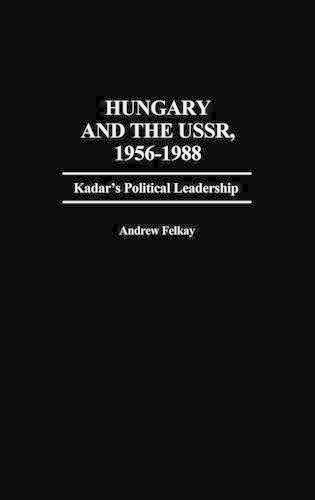
Hungary and the USSR, 1956-1988: Kadar's Political Leadership
(Hardback)
Publishing Details
Hungary and the USSR, 1956-1988: Kadar's Political Leadership
By (Author) Andrew Felkay
Bloomsbury Publishing PLC
Praeger Publishers Inc
10th January 1989
United States
Classifications
Tertiary Education
Non Fiction
European history
327.439047
Physical Properties
Hardback
343
Width 156mm, Height 235mm
737g
Description
In this analysis of Hungarian political and economic developments over the past 30 years, Andrew Felkay focuses particularly on the role played by the country's long-time communist leader, Janos Kadar. Basing his study on a critical analysis of the official Hungarian press, ideological journals, relevant documents, and other statistical reports from 1956 to the present, Felkay argues that Hungary's rapid recovery from the cataclysmic events of 1956 was the direct result of Kadar's ability to overcome the alienation of his compatriots without incurring the displeasure of the Soviet Union. Felkay's reliance on primarily Hungarian Communist sources offers the reader a window on Kaldar's political emergence as a pragmatic and unusually successful Communist leader. Felkay begins with a brief history of Hungary and Soviet-Hungarian relations to the end of World War II, setting the context for the detailed political case study which follows. Subsequent chapters detail Kadar's youth, his early involvement with the Communist party, and his installation by the Soviets as Hungary's leader in the wake of the 1956 uprising. Felkay demonstrates that despite the circumstances of his selection and his lack of domestic support, Kadar emerged as an effective political leader in his own right. His introduction of innovative non-Marxist structural economic reforms, Felkay argues, enabled Kadar to create one of the most efficient economic systems within the Soviet bloc. The book continues with chapters covering the Czechoslovak crisis of 1968, the slowing of reforms, the effects of worldwide price explosions in the early 1970s, and the mounting economic problems that confronted Kadar and the Hungarian people inthe 1980s. The concluding chapters address the most recent developments, including Kadar's removal from office and the impact of Gorbachev's glasnost and perestroika, and predicts likely future trends.
Reviews
A very timely and comprehensive summary of events and developments in Hungarian-Russian relations. Hungarian-born Felkay focuses mainly on the role of Hungarian Communist party leader Janos Kadar, especially after the defeat of the 1956 Revolution. As a small East-Central European country whose non-European language is difficult to master, Hungary has aroused interest mostly on occasions of major domestic upheavals and crises. Most recently much attention has centered on Hungarian experimentation with capitalism, democratization, and liberalization of the Communist system. Most of the chapters concentrate on Kadar's consolidation of his power after the defeat of the Revolution in 1956, and on the successful restructuring of the economy. Brought to power by the Soviets in 1956, Kadar managed to become a popular leader in his own right while retaining Russian support for his policies. The slowing of the reforms, the worldwide price exposions, and the mounting political and economic problems led to Kadar's honorable retirement in 1988. For the first time since WW II, the changes in the top Hungarian leader occurred without direct Soviet interference. The author's extensive documentation is based on primary and secondary sources in Hungarian, Russian, and English. The book fills a gap in Western scholarship of the Kadar era. Notes, selected bibliography, and index are very helpful, essential for upper-division undergraduates, graduate students, faculty.-Choice
"A very timely and comprehensive summary of events and developments in Hungarian-Russian relations. Hungarian-born Felkay focuses mainly on the role of Hungarian Communist party leader Janos Kadar, especially after the defeat of the 1956 Revolution. As a small East-Central European country whose non-European language is difficult to master, Hungary has aroused interest mostly on occasions of major domestic upheavals and crises. Most recently much attention has centered on Hungarian experimentation with capitalism, democratization, and liberalization of the Communist system. Most of the chapters concentrate on Kadar's consolidation of his power after the defeat of the Revolution in 1956, and on the successful restructuring of the economy. Brought to power by the Soviets in 1956, Kadar managed to become a popular leader in his own right while retaining Russian support for his policies. The slowing of the reforms, the worldwide price exposions, and the mounting political and economic problems led to Kadar's honorable retirement in 1988. For the first time since WW II, the changes in the top Hungarian leader occurred without direct Soviet interference. The author's extensive documentation is based on primary and secondary sources in Hungarian, Russian, and English. The book fills a gap in Western scholarship of the Kadar era. Notes, selected bibliography, and index are very helpful, essential for upper-division undergraduates, graduate students, faculty."-Choice
Author Bio
ANDREW FELKAY is Professor of Russian at Kutztown University.
